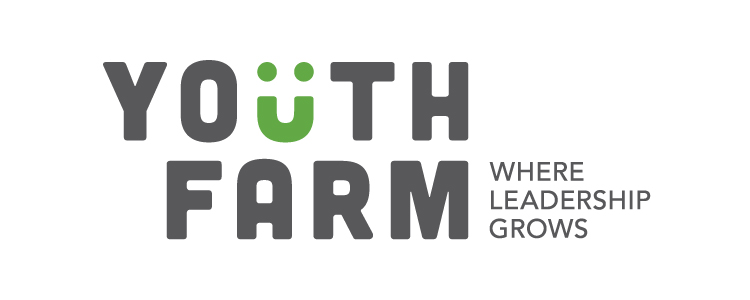At Youth Farm, we often talk about building resilient networks of support for youth – but what does that mean, really? Well, part of that work includes connecting to like-minded organizations and working collaboratively to provide engagement opportunities for youth. As Leo Howard III, the Residential Program Administrator at Rebound, pointed out, “A lot of youth don’t even know about the community programs that exist for them.”
Rebound is a Minneapolis-based organization that works to create possibilities for youth in their own communities, specifically focused on eliminating reliance on the juvenile justice system while meeting the needs of Black youth. In an effort to bridge gaps and connect the youth he works with to the community initiatives happening in their own neighborhoods, Leo began working with Youth Farm’s Director of North Minneapolis Programs, Marcus Kar, during the 2021 growing season.

Youth Farm’s Director of North Minneapolis Programs, Marcus Kar (far left), guides Rebound program participants in a planting activity
“When I first connected with Marcus, he took me out to meet with another one of Youth Farm’s partners – the Loppet Foundation,” Leo said. “Within that first meeting I learned so much about both organizations’ programs. We also talked about how so many youth and community members feel like spaces like Theo Wirth Park (where Loppet is headquartered) aren’t for them. Together we need to do the work to make these spaces welcoming and show young people the possibilities that exist within them.”
As part of the work to make this happen, Marcus and Leo brought program participants from both Youth Farm and Rebound together in garden spaces across the Twin Cities. In our first year of partnership, teens worked together, leading and mentoring each other in activities including planting flowers, harvesting and pitting cherries to use in pies, and cleaning up garden spaces. Being in green spaces together has sparked conversations about food insecurity, why it is happening, and the power young people have to address it through community initiatives.

Two Rebound program participants water a newly planted tree together
“We are planting seeds both figuratively and literally,” Leo said. “Historically, I have seen a lot of youth programs address challenges that young people face through punishment, exclusion, and other reactionary methods – this does not address the real issues. My goal is to meet youth where they are at and find creative, innovative, and engaging ways to proactively learn about what they are going through and involve them in things that support them long-term both mentally and physically.”
Leo believes that community food work is not only a tangible way for youth to grow food and address food insecurity, it is also a way for them to build peer to peer and cross generational relationships.

Youth Farm Project LEAD, CeeCee (right), leads teens from Rebound in a garden watering activity
“As a youth worker, one thing that is important to understand is that so many young people have to put on a facade when they are out and about in their communities to protect themselves,” Leo said. “To change the systems that have made them feel this way, building relationships is one of the most powerful tools we have. When a young person has already connected with someone in a garden or on a bike ride or in a kitchen, they are able to break down walls and move through their community as themselves. Building trust is a game changer.”
After a summer of hands-on garden work, we are looking forward to the possibilities that exist as we continue to deepen our partnership with Rebound. In the coming years, Leo hopes to connect some of the teens he works with to jobs at Youth Farm. As we continue to make food and farming opportunities available to youth who need them most, we are also hoping to expand hands-on programming with Rebound to include cooking classes, farmers markets, and mentoring for younger youth.

Teens from Youth Farm and Rebound prepare to plant a garden bed together
“I think it is so important that people take this work seriously,” Leo said. “Being involved in collaborative community projects has more impact on young people than we know. It builds ownership, accountability, confidence, and trust.”

